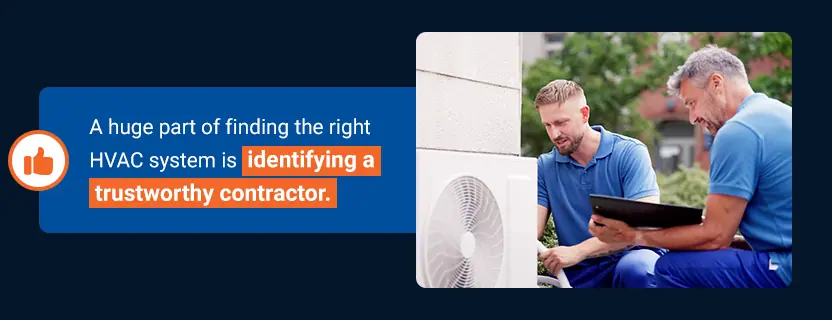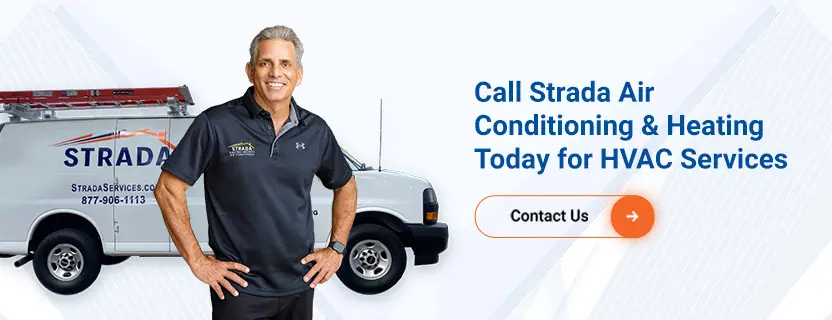
Your heating, ventilation and air conditioning (HVAC) system is one of the most important systems in your home, running quietly in the background to manage interior temperatures. Without HVAC, you’d be dealing with chilly temperatures in the winter and unmanageable heat in the summer.
HVAC systems also ventilate your home, keeping the air quality healthy for your family to breathe. When it’s time to upgrade, asking the right questions can help you find the best system for your home. Keep reading to learn more about choosing the right HVAC system.
There are many effective and affordable options available for upgrading your HVAC. However, choosing the best HVAC system for your home depends on many personal factors and preferences. A few things to consider include the type of system, energy efficiency and your budget.
Before choosing an HVAC system, look at your current system. Replacing your system with a similar setup is likely the most cost-effective option.
Other considerations include the climate and weather where you live and what fuel sources are available. If you want to learn more about how HVAC systems work in your region, ask local contractors for advice — for those in the Southeast, choosing the best AC system is likely your top priority. Local businesses are familiar with the area and have experience working with different types of systems. Based on your information, they can help you make the best decision for your home.
The right kind of HVAC system depends on your needs. Although some HVAC systems combine heating and cooling in one package, others operate with separate types of equipment. For example, some HVAC systems rely on ductwork, while others are ductless.
Here’s a quick list of some common types of HVAC equipment:
Different kinds of HVAC systems run on different kinds of energy. Some systems heat water, while others use residual heat in the earth or air to run. The best system for you depends on your budget and the equipment available in your area.
HVAC systems are controlled by a thermostat, where you can set and monitor temperatures. If you invest in a smart thermostat, you can adjust your HVAC system over a phone app and integrate it with other smart technology around your home.
Depending on the size of your home, you may need different sizes of equipment. For example, you don’t need a massive AC system to cool a small house. To find the best option for you, determine the square footage of your home and then compare that with size charts for the HVAC equipment. For example, if you buy an air conditioner for a 900-square-foot home, general guidelines suggest a unit with around 18,000 British thermal units (BTUs). Check your product specifications for more precise information.
You can also talk to a local HVAC representative about which equipment size is right for you. Although larger options are typically more expensive, smaller equipment may not properly heat or cool your home. If you overwork your HVAC system, it won’t last as long, and your energy bills may be higher.
Energy efficiency is another factor to consider. Some HVAC models are more efficient than others — a general rule is to look for ENERGY STAR certification on equipment. You can also talk to an HVAC expert about energy-efficient appliances.
Upgrading your HVAC system comes with several different costs. In addition to purchasing new equipment, you’ll need to pay for the labor required to remove the old equipment and install the updated systems.
Costs can vary, depending on your location, the type of system you choose and how much equipment needs to be replaced. While installing HVAC equipment yourself might seem like a way to save costs, any issues could create significant expenses in the future. Paying a professional for their time is well worth getting the job done right.
Another cost to consider is maintenance. Think about how long your new equipment will last and what you can do to extend its longevity. If you schedule regular maintenance, you can avoid costly repairs and keep your equipment running longer.

A huge part of finding the right HVAC system is identifying a trustworthy contractor. Your HVAC contractor can help guide you through the many different options for your HVAC system while keeping your budget and efficiency goals in mind.
Here are a few questions to consider as you’re choosing an HVAC contractor:
Once you’ve established the trustworthiness of a contractor, you can reach out to them with specific questions about HVAC options, pricing, the installation process and more. Navigating HVAC for your home can be challenging, but a reputable contractor makes the process much easier.
Your HVAC system is something you’ll use every day. A question many people forget to ask is not, “Is this the best system?” but “Is this system easy to use and comfortable to live with?” Here are a few things to consider for comfort:
By thinking through these practical questions, you’ll get an idea of what living with your new HVAC system may be like. Ultimately, you’ll live with your HVAC system for the foreseeable future, so make sure it’s one you like.

Strada Air Conditioning & Heating has served customers in the Southeast for over 20 years. We want to make caring for your home easy, so we offer cooling, heating, electrical and security services, all from one trusted source.
At Strada Air Conditioning & Heating, we can help you with HVAC installation for cooling, heating, ventilation and more. We offer 24/7 online scheduling and aim to provide peace of mind to our customers. You can find Strada Air Conditioning & Heating in North and South Carolina, Alabama, Tennessee, Georgia and Florida.
Contact us today to book an appointment and learn more!